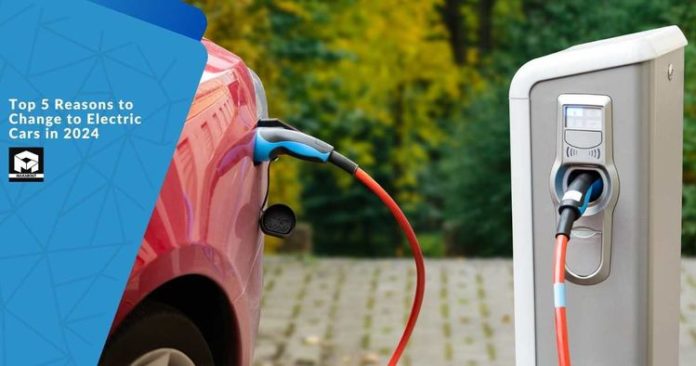The trend toward electric cars (EVs) is increasing in the modern world and for good cause. The advantages of moving to electric vehicles instead of traditional gasoline-powered cars are becoming more and more obvious as 2024 draws near. Let’s examine the top five arguments for why converting to electric cars in 2024 is a wise decision for the environment as well as for people.
1. Environmental Benefits
When it comes to tackling pressing environmental challenges like air quality and climate change, electric vehicles (EVs) are a must and the decrease in greenhouse gas emissions is one of the main benefits of EVs. Unlike traditional internal combustion engine vehicles, electric vehicles (EVs) do not emit exhaust pollutants. Electricity which powers them is generated from a variety of sources including renewable energy sources like solar and wind power. This shows that the total carbon footprint of an electric vehicle (EV) is substantially lower than that of a vehicle fuelled by gasoline or diesel. Therefore, choosing electric vehicles will benefit the environment.
Within highly populated metropolitan areas conventional automobiles are a major cause of air pollution due to their emission of dangerous pollutants such as particulate matter and nitrogen oxides (NOx). Since electric vehicles (EVs) do not release any emissions into the atmosphere, everyone can breathe cleaner, healthier air.
2. Lower Operating Cost
Electric vehicles (EVs) have several advantages over conventional gasoline or diesel-powered automobiles, chief among them being their significantly lower operating costs.y The primary reason for this cost savings is the price differential between electricity and gasoline or diesel fuel. Because electricity costs less per mile than fossil fuels, you will save a lot of money on fuel for your vehicle. Thus, opting for electric vehicles in the future makes sense.
Moreover, EV maintenance expenses are substantially lower. Electric cars have fewer moving parts than gasoline-powered vehicles which means fewer parts are susceptible to failure or require maintenance. Because you won’t have to pay as much for routine maintenance like oil changes and exhaust system repairs, your maintenance expenses will go down as a result.
Further lowering the overall cost of ownership is the fact that extended battery pack warranties are typically provided with EVs. Owners of electric vehicles (EVs) can experience a reduction in maintenance costs and fewer trips to the mechanic because of their reduced failure rate and lower maintenance requirements.
3. Reduced Dependence on Fossil Fuels
One significant issue that can be resolved by moving to electric vehicles is dependency on fossil fuels (EVs). One of the main advantages of electric vehicles (EVs) is that they run on electricity. Energy produced from a variety of sources, many of which are shifting more and more toward cleaner and more sustainable options, powers electric vehicles (EVs).
Choosing to use an electric vehicle can significantly reduce an individual’s impact on the depletion of finite fossil fuels (EV) and there are several benefits to this reduced reliance. It first decreases the need for non-renewable resources such as natural gas and oil. Reducing dependency on imports of foreign oil and the ensuing geopolitical unrest improves energy security.
4. Tax Incentives and Rebates
Tax breaks and rebates play a major role in encouraging people to convert to electric vehicles, which is very advantageous for both consumers and business owners. To promote the use of electric vehicles which in turn lowers emissions and reduces air pollution in metropolitan areas, governments and municipal authorities frequently offer these incentives.
Certain regions could offer tax benefits that surpass the initial acquisition. Road tolls and congestion fines may be abolished or lowered, and owners of electric rickshaws may benefit from lower annual vehicle taxes. Over time, these ongoing advantages lower the cost of owning and running electric rickshaws which promotes their widespread use.
There are more potential funding sources for infrastructure development such as tax reductions and incentives. To facilitate EV drivers’ access to convenient charging facilities governments may offer financial support for the construction of charging stations.
5. Charging Convenience
Electric cars are a practical and effective solution for urban transportation since, among other things, they are easy to charge. Electric cars can be charged quickly and cheaply, in contrast to traditional fossil fuel-powered cars, which need regular trips to the gas station.
Having charging outlets nearby is a major advantage of switching to electric cars. Due to the growing infrastructure, owners of electric vehicles now have a range of options for charging their cars including home charging options, private charging facilities, and public charging stations. Thus, you won’t have to worry about charging if you buy an electric car. An easy-to-use home charging station is convenient for owners of electric vehicles. All owners have to do is plug their vehicles into a standard outlet at home or work.

